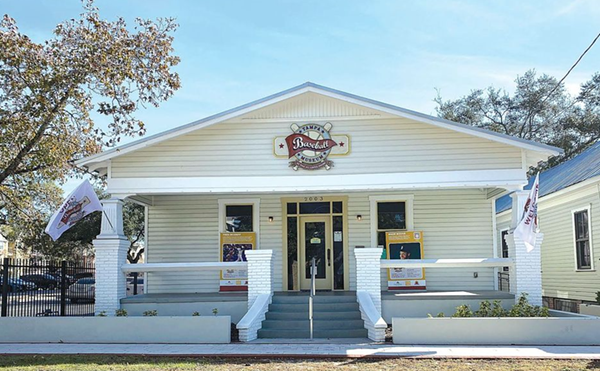Orlando
Runs through March 29 at the Straz’s Shimberg Playhouse in Tampa; showtimes 8 p.m. Thursdays-Saturdays, 4 p.m. Sundays. $28 for general admission.
jobsitetheater.org.
If there’s a central idea animating Orlando at Jobsite Theater, it’s that a single gender is not enough. In Sarah Ruhl’s adaptation of Virginia Woolf’s novel, one finds an aching for more experience — other eras, other selves — and a certainty that only by tasting the fruits of time-and-gender travel can a human mind ever be satisfied. If this sounds controversial, you’d never know it from Ruhl’s script: her hero/heroine Orlando changes from male to female, and from the Elizabethan to the Victorian world, with hardly a hiccup of surprise and without the least nostalgia for yesterday’s genitals.
But even the word “genitals” is too crude for this elegant exercise: Orlando slips from one thing to another with such effortless lyricism, such graceful sophistication, you’d never guess that anything as vital as a person’s identity was at stake. Which is another way of saying, I was impressed by this drama — beautifully presented by five Jobsite actresses — but the enjoyment was purely cerebral. I don’t think I’ve ever before seen the contentious issue of sexuality treated so bloodlessly.
When the story begins, Orlando is a male — though actress Katrina Stevenson doesn’t try very hard to make him seem so —and living in Elizabethan England. Here he, or his shapely legs, are noticed by the Queen herself, who takes him to court and makes him her treasurer and steward. Notwithstanding the Queen’s designs, Orlando falls in love with Sasha, a Russian noblewoman, and suffers the pangs and arrows of outrageous romance before his love finally leaves him. Finding himself pursued by a predatory Archduchess, he asks to be sent to Constantinople — and it’s there, after a long snooze, that he wakes up to find himself turned into a woman. The transformed Orlando returns to England, discovers that the Archduchess is now an Archduke, and has further adventures of the amorous sort as she finds herself transported to Victorian and then to modern times.
The story is told partly as narration, partly in dialogue. The spectacle of the five Jobsite performers in Stevenson’s lovely white costumes is as sophisticated as the language.
The actresses, sharply directed by Giles Davies, could hardly be better. As Orlando, Stevenson displays a splendid iridescence. If she doesn’t, in the opening scenes, try to convince us she’s a male, still she shows us in these two acts twenty or thirty different hues of emotion and attitude, all while maintaining an ironic, Brechtian distance from her character.
As Queen Elizabeth, Ami Sallee is equally successful, and notably more comic. She is a shrewd, finicky, but needy monarch, one used to disguising her sexual requirements even while making sure that they’re satisfied by favorites like Orlando. In the role of Sasha, Emily Belvo is a cartoon version of a heartbreaker, coy and suggestive and then terribly absent just when Orlando most needs her proximity. And Jonelle M. Meyer as the Archduchess is an amusingly exaggerated caricature of an aristocrat, haughty and smug even while she participates in the universal craving for a paramour.
Finally, there’s the radiant Nicole Jeannine Smith as the female Orlando’s male lover Marmaduke. In this part, she’s near perfect: intrepid and assured, a fine match for our time-travelling, age-defying hero/ine. It’s also in the scenes with Marmaduke that the play most explicitly turns into a meditation on gender, and if the tone still trills of Bloomsbury, still it’s a relief to find Orlando looking inward at last. (One is tempted to ask, what took you so long?)
Brian Smallheer’s set, featuring a raised round wooden platform, three trees and some cutouts of buildings to distinguish London from Constantinople, is serviceable if not particularly winning, but his lighting is impeccable.
Woolf wrote the novel Orlando as a roman à clef for her lover Vita Sackville-West, and it references various real personages who will of course be unknown to most theatergoers. Maybe that’s what keeps Ruhl’s adaptation from hitting us in the solar plexus: we don’t have what Woolf and her lover had, the knowledge of the fleshy human bodies to whom these figurines allude. In any case, Orlando is a somewhat pleasing but oddly distancing drama. In our sex-and-gender-obsessed society, it feels both relevant — and all too exquisite.
Unforgettable. Opera doesn’t get much better than last weekend’s Madama Butterfly at the Straz Center. Yunah Lee as Butterfly and Richard Troxell as Pinkerton were stunning, as was the whole gorgeous production. I have just enough space here to say: Wow!



















